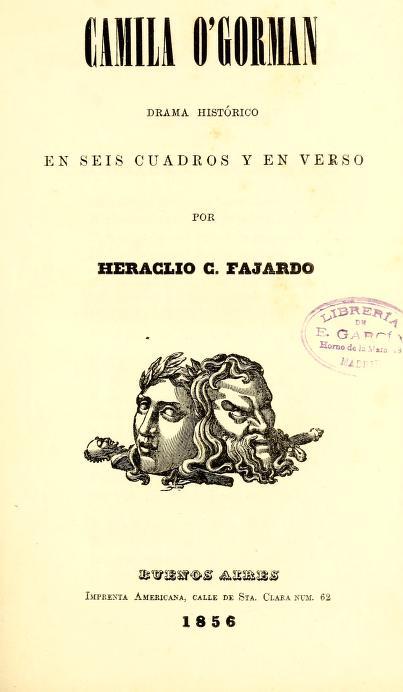"To the Spirits of Camila O'Gorman"
Annotation
The story of Camila O'Gorman (1828-1848), the daughter of a prominent merchant in the Buenos Aires community, is one of the most famous cases of a young person challenging both parental and state authority. In 1847, at the height of Rosas's power, 19-year-old Camila and Ladislao Gutiérrez, a young Catholic priest from Tucumán, fell in love. On December 12, 1847, they eloped and fled to Corrientes, a neighboring province to Buenos Aires. Eight months later, they were captured, imprisoned at Santos Lugares, and put to death by a firing squad. History has been more kind to Camila than to Gutiérrez. The young priest was condemned for violating the Church's code of conduct and the social order. Many eyewitnesses, including Camila's father, Adolfo O'Gorman (see document 9), blamed the beleaguered priest for manipulating an impressionable young woman.
Camila O'Gorman's execution in August 1848 had repercussions long after her death. Her death touched off a series of international protests against the caudillo dictator. Before the execution, exiled Unitarians in Uruguay taunted Rosas in their newspapers for not doing enough to put an end to Camila's unlawful and illicit behavior. After Camila's death, however, they used Camila's story to show that Rosas was cruel and bloodthirsty. After Rosas was overthrown in 1852, strong feelings about Camila's death sentence remained. In 1856, the Uruguayan author, Heraclio Fajardo (1833-1868), wrote a six act play simply titled "Camila O'Gorman" in her honor. In the play, he also dedicated a poem to her, "To the Spirits of Camila O'Gorman," as an impassioned plea for future generations of Argentines to not repeat the mistakes of the Rosas era.
This source is a part of the Parents, Children, and Political Authority in 19th century Argentina teaching module.
Text
To the Spirits of Camila O'Gorman
In vain the echo of my dark accent
To vindicate your spirit it rises,
Because my voice drowns in the throat
Of the passions the violent din. . .
But it does not matter!. . . If the barbaric assassin
That ended your miserable days
Has left evil roots
In the bosom of the Argentine space
A new progeny rises
That now stomps the threshold of the future
And it will root out those germs of the crime
With the ease of his angered sole!. . .
A new progeny, that imbued
Of the thought that May gave birth to,
Will fulminate with implacable ray
The remains of the despotic murderer!. . .
It is her turn to remove the graves. . .
To wash the stains that imprint on you
Those that applaud, sacrilegious, the crime
That in you, Camila, Rosas perpetrated.
H.C.F.
Buenos Aires, October 30, 1856
Credits
Translated and annotated by Jesse Hingson.
